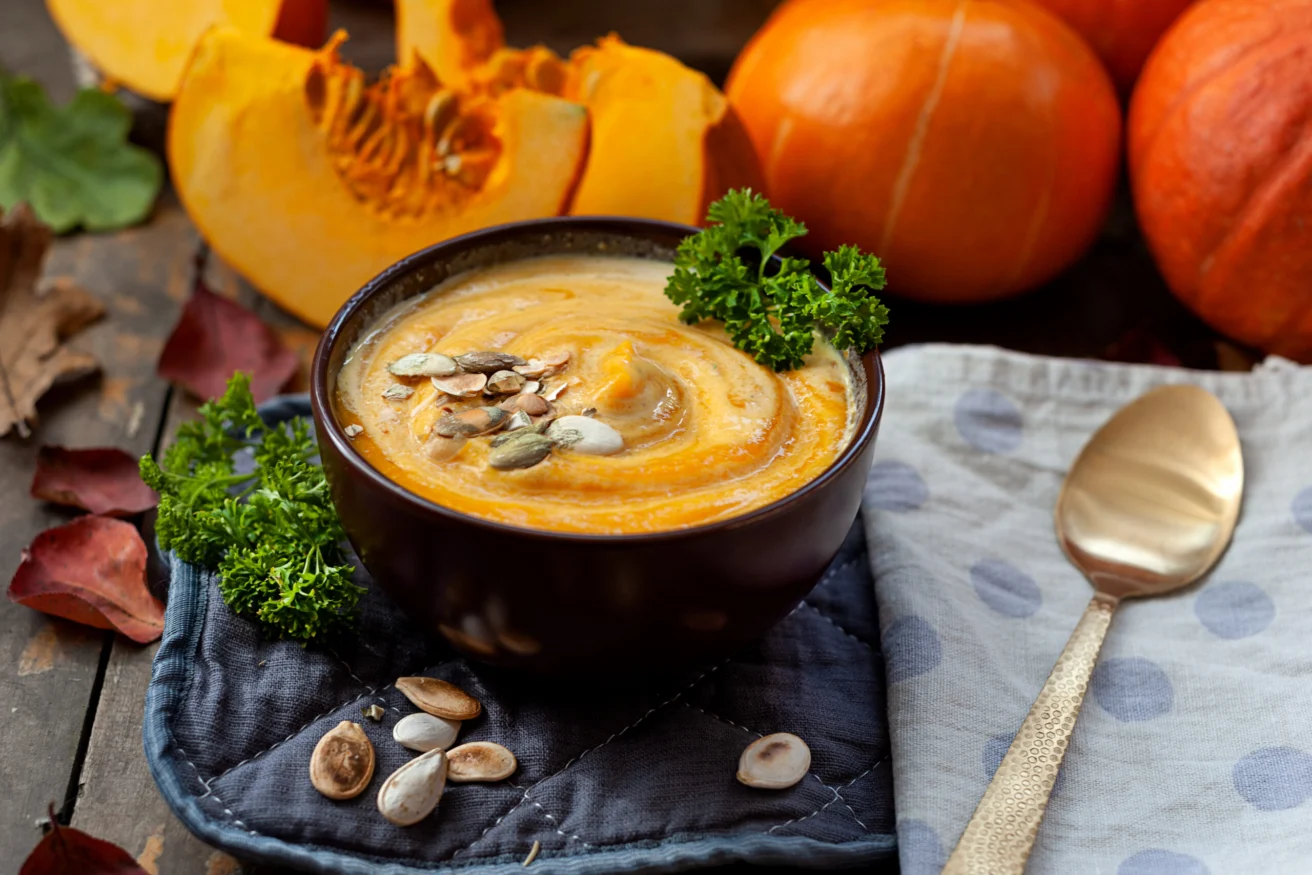Pumpkin: the Superfood

When autumn rolls around, pumpkins take center stage in everything from festive decorations to flavorful treats. But did you know that pumpkins are more than just a symbol of fall? They are also packed with a variety of nutrients that can offer significant health benefits, making this autumnal fruit a superfood. Whether you’re enjoying pumpkin in a savory soup, a sweet pie, or even a smoothie, this versatile fruit can be a powerful addition to your diet. Let’s dive into the top health benefits of pumpkin and why you should consider adding more of it to your meals.
Why should you eat pumpkin?
1. Rich in Vitamins and Minerals
Pumpkins are an excellent source of essential vitamins and minerals. A single cup of cooked pumpkin contains over 200% of the recommended daily intake of vitamin A, which is crucial for maintaining healthy vision, supporting immune function, and promoting skin health. It is also high in vitamin C, which helps boost immunity, as well as potassium, magnesium, and vitamin E, all of which contribute to overall well-being.
2. High in Antioxidants
Pumpkins are loaded with antioxidants like beta-carotene, a carotenoid that gives pumpkin its vibrant orange color. Beta-carotene is converted into vitamin A in the body, which helps protect your cells from damage caused by free radicals. This antioxidant effect can lower your risk of chronic diseases, including heart disease and certain cancers. Additionally, the antioxidants in pumpkin support skin health, potentially reducing the signs of aging and improving skin texture.
3. Pumpkin Supports Weight Loss
If you’re looking to manage your weight, pumpkin can be a great addition to your diet. It is low in calories but high in fiber, making it a filling food that can help you stay satisfied for longer periods. The fiber in this autumn favorite slows down digestion, which can help regulate blood sugar levels and reduce cravings. This can be particularly beneficial for those aiming to maintain or lose weight.
4. Promotes Heart Health
The nutrients in pumpkin, such as potassium, vitamin C, and fiber, all contribute to heart health. Potassium helps regulate blood pressure, which is essential for cardiovascular health. Fiber, on the other hand, aids in lowering cholesterol levels, reducing the risk of heart disease. Regularly consuming foods rich in these nutrients can help keep your heart in top condition.
5. Pumpkin Boosts Immunity
As we head into the colder months, supporting your immune system becomes even more important. Pumpkin is a powerful ally in this regard, thanks to its high vitamin A and C content. Vitamin A plays a crucial role in supporting your body’s natural defenses by maintaining the health of your skin and mucous membranes, which act as barriers against infections. Vitamin C enhances the production of white blood cells, strengthening your body’s ability to fight off infections.
6. Good for Eye Health
Pumpkin’s high levels of beta-carotene, which the body converts to vitamin A, are particularly beneficial for eye health. Vitamin A is essential for maintaining good vision, especially in low-light conditions. Additionally, this fruit contains lutein and zeaxanthin, two antioxidants that are linked to a reduced risk of age-related macular degeneration and cataracts.
7. Enhances Skin Health
The vitamins and antioxidants in pumpkin also contribute to glowing, healthy skin. The high vitamin C content aids in collagen production, which is vital for maintaining skin elasticity and preventing wrinkles. Meanwhile, the beta-carotene in pumpkin can help protect your skin from UV damage, acting as a natural sunscreen from within.
8. Supports Digestive Health
Pumpkin is rich in dietary fiber, which is essential for a healthy digestive system. Fiber adds bulk to your stool, helping to prevent constipation and promoting regular bowel movements. Additionally, the high fiber content can feed the good bacteria in your gut, supporting a healthy microbiome, which is important for overall digestive health.
How to Incorporate Pumpkin into Your Diet
There are countless ways to enjoy pumpkin in your diet. Here are a few ideas:
- Soups and Stews: Pureed pumpkin adds a creamy texture and rich flavor to soups and stews.
- Smoothies: Blend pumpkin puree into your morning smoothie for a nutrient-packed breakfast.
- Baking: Use pumpkin in baked goods like muffins, bread, and pancakes for a healthy twist.
- Roasted Pumpkin Seeds: Don’t forget about the seeds! Roasted pumpkin seeds are a crunchy, nutritious snack high in healthy fats and protein.
Conclusion
Pumpkin is far more than just a seasonal decoration. Its rich nutritional profile offers a variety of health benefits, from supporting heart and eye health to boosting your immune system and aiding in weight management. As fall approaches, make sure to take advantage of this versatile and delicious fruit by incorporating it into your diet. Your body will thank you for it!
So, next time you see a pumpkin, think beyond the pie and consider all the ways this nutrient-packed powerhouse can contribute to your health.
Options Medical Weight Loss programs include health coaching to guide and support you in nutrition that will best support your weight loss and weight management. Schedule a free weight loss consultation today.
Read more ideas how to incorporate pumpkin into your diet at the Mayo Clinic.


